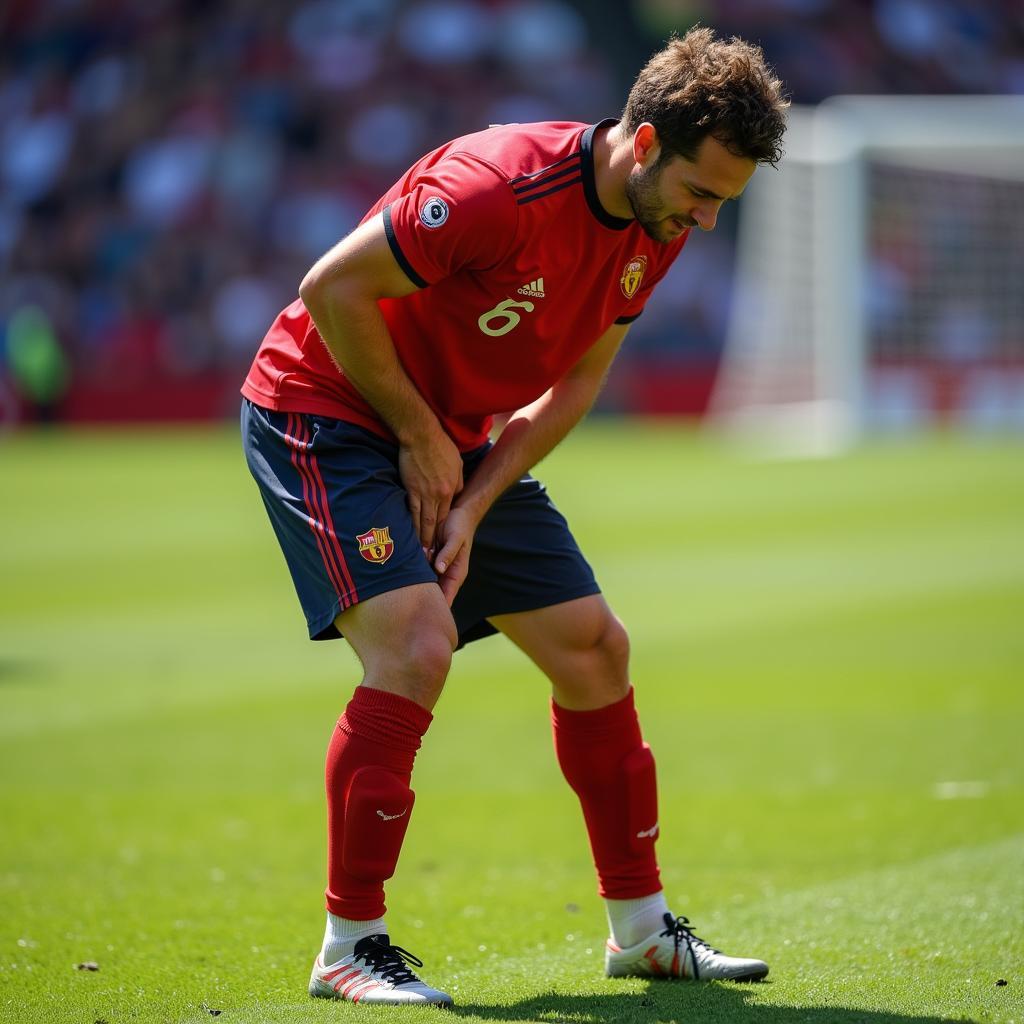Explaining Muscle Cramps in Football Players
November 9, 2024Muscle cramps are a common and frustrating experience for athletes, especially in high-intensity sports like football. They can strike suddenly, causing intense pain and temporarily hindering performance. Understanding what causes muscle cramps and how to prevent them is essential for any footballer, from aspiring amateurs to seasoned professionals like myself.
What Causes Muscle Cramps?
Traditionally, muscle cramps were thought to be primarily caused by dehydration and electrolyte imbalances, particularly a lack of potassium or sodium. While these factors can certainly play a role, recent research suggests a more nuanced picture. Neuromuscular fatigue, where the communication between the nerves and muscles becomes disrupted, is now considered a key contributor. This can happen when muscles are overworked, particularly in hot and humid conditions. Imagine sprinting repeatedly for 90 minutes – your muscles are constantly firing, and this can lead to the misfiring that causes cramps.
The Role of Dehydration and Electrolytes
While not the sole cause, dehydration and electrolyte imbalances can exacerbate muscle cramps. When you sweat heavily, you lose not only water but also essential electrolytes like sodium, potassium, magnesium, and calcium. These electrolytes are crucial for proper muscle function, and their depletion can increase the likelihood of cramps.
 Football Player Dehydrated with Muscle Cramp
Football Player Dehydrated with Muscle Cramp
Neuromuscular Fatigue: The Primary Culprit?
Neuromuscular fatigue occurs when the nerves that control muscle contractions become overstimulated. This can lead to involuntary muscle spasms, which we experience as cramps. Factors like muscle overuse, poor conditioning, and inadequate stretching can contribute to this fatigue. Think of it like overloading an electrical circuit – eventually, it blows a fuse. Similarly, overworked muscles can experience a disruption in nerve signals, leading to cramps.
Preventing Muscle Cramps in Football
Fortunately, there are several strategies to minimize the risk of muscle cramps. Proper hydration is crucial. Drink plenty of fluids throughout the day, especially before, during, and after training or matches. Electrolyte drinks can also be beneficial, particularly in hot weather. Adequate conditioning and regular stretching are also important for preventing neuromuscular fatigue.
 Football Player Stretching to Prevent Muscle Cramps
Football Player Stretching to Prevent Muscle Cramps
Effective Treatment for Muscle Cramps
If you do experience a muscle cramp, the first step is to gently stretch the affected muscle. Holding the stretch for 30-60 seconds can help to relax the muscle spasm. Massage can also be beneficial. Replenishing fluids and electrolytes is important, especially if you’ve been sweating heavily.
Why Do Muscle Cramps Happen During Football Matches?
The intense physical demands of football, combined with often hot and humid playing conditions, create a perfect storm for muscle cramps. Players are constantly running, jumping, and changing direction, putting immense strain on their muscles. This, coupled with fluid and electrolyte loss through sweat, significantly increases the risk of cramps.
How Can I Tell If I’m Dehydrated?
Common signs of dehydration include thirst, dry mouth, fatigue, headache, and dizziness. Monitoring the color of your urine can also be a good indicator. Dark yellow urine suggests dehydration, while pale yellow or clear urine indicates adequate hydration.
What are the best stretches for preventing cramps?
Focus on stretches that target the major muscle groups used in football, such as hamstrings, quads, and calves. Examples include hamstring stretches, quad stretches, and calf raises.
Staying Cramp-Free: A Key to Peak Performance
Muscle cramps can be a significant impediment to performance in football. By understanding the underlying causes and implementing preventive measures, you can minimize your risk and stay focused on the game. Proper hydration, electrolyte balance, adequate conditioning, and regular stretching are all essential components of a cramp-free strategy.
Muscle cramps are a common occurrence in football due to dehydration and neuromuscular fatigue. Prevention strategies include proper hydration, electrolyte balance, and regular stretching.
Can certain medications increase the risk of cramps?
Yes, certain medications, such as diuretics and statins, can sometimes increase the risk of muscle cramps. Consult with your doctor if you suspect your medication is contributing to cramps.
What should I eat to prevent cramps?
A balanced diet rich in fruits, vegetables, and whole grains is essential for maintaining electrolyte balance and supporting muscle function. Foods like bananas, oranges, and spinach are particularly good sources of potassium and magnesium.
In conclusion, understanding the causes and prevention of muscle cramps is vital for any footballer. By following the advice outlined in this article, you can minimize your risk and stay at the top of your game. Remember, staying cramp-free is key to unlocking peak performance on the pitch.
FAQ
- What is the main cause of muscle cramps? Neuromuscular fatigue.
- How can I prevent muscle cramps? Hydrate properly, maintain electrolyte balance, and stretch regularly.
- What should I do if I get a cramp during a match? Gently stretch the affected muscle and rehydrate.
- Are electrolyte drinks helpful? Yes, especially in hot conditions.
- Can stretching help prevent cramps? Yes, regular stretching can help reduce the risk of neuromuscular fatigue.
- What are the signs of dehydration? Thirst, dry mouth, fatigue, headache, dizziness, and dark urine.
- How can I stay hydrated during a match? Drink plenty of fluids before, during, and after the game.
For further support, please contact us: Phone: 0396443476, Email: [email protected] or visit us at: 23 Thang 3, Dak Nia, Gia Nghia, Dak Nong, Vietnam. We have a 24/7 customer service team.